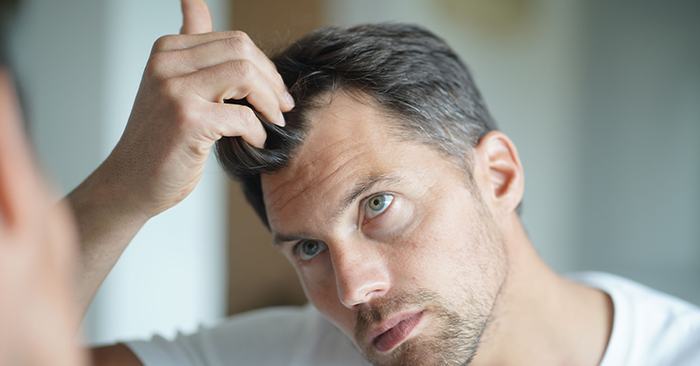Hair loss can generally stem from various reasons and is often hereditary in our country and surrounding regions. Whatever the cause, geographical or stress-related factors are no longer inevitable. Thanks to modern medical technologies, excessive hair loss can be easily treated, allowing you to regain your hair in your twenties and even grow new hair. Reading this guide we’ve prepared to acquire detailed information about treatments that restore our thinning hair and confidence can change your life!
Male Pattern Baldness
Intense hair loss, especially due to stress and genetic factors, is a commonly seen condition in men. A receding hairline, temples, or crown is by no means the end of the road for our appearance and confidence. Let’s take a look at the reasons for male pattern baldness now.
Hair loss in men can be attributed to various factors such as genetic predisposition, aging, anemia, immune-related causes, previous medical treatments, and thyroid disorders. Moreover, according to recent research, vitamin deficiency, prolonged high stress, obesity, and improper nutrition can also lead to thinning of hair follicles and hair loss.
Male pattern baldness, also known as androgenetic alopecia, is the most common type of hair loss in men in our region. Below, it can be seen that hair loss progresses from the front of the hair to the temples and then shows thinning at the crown in subsequent stages. Hair loss in the occipital region is rare in a healthy individual.
This hereditary hair loss stems from genetic predisposition to a testosterone type called dihydrotestosterone (DHT).
Female Pattern Hair Loss
Hereditary female pattern hair loss can occur without affecting some family members for generations. However, some women may experience some degree of hair thinning at some point in their lives, even if it doesn’t affect any of their family members. Hair loss in individuals with this condition can start in late adolescence and typically worsens after menopause. Hair loss in women is a serious aesthetic concern.
Reasons for Female Pattern Hair Loss
The psychological effects of hair loss can often be more exhausting and demoralizing for women than for men. Fortunately, this unpleasant condition, for which there is now a definite solution, contrary to common belief, is not only for men.
While some women complain of a wide forehead, this condition is usually more about where the hair starts than about hair loss itself. Increasing numbers of people suffering from female pattern hair loss or a wide forehead are showing interest in female hair transplantation.
Hair Loss During Pregnancy
Hair loss can occur in some pregnant women due to stress and hormonal changes. This issue experienced by some pregnant women is referred to as telogen effluvium. Since the hormonal balance of the woman changes significantly to support the developing fetus during pregnancy, the body may experience stress in the first three months.
Can adolescence cause hair loss?
Since men continuously produce testosterone throughout their lives, they also continuously produce DHT. This makes men more prone to hair loss compared to women.
We know that hormone levels fluctuate during adolescence, and this can affect hair growth and health. Hair loss can start immediately after adolescence and increase over time. While balanced hormones maintain the normal functioning of the body, imbalanced hormones can lead to mental and physical issues. If adolescents are frequently exposed to stress, hair loss may be more severe due to hormonal changes than usual.
One of the most frequently asked questions is which department to go to for hair loss. Expertise in detecting and treating hair loss lies in the field of dermatology. Therefore, it is appropriate to consult a dermatologist for hair loss. Although considered a benign health problem, hair loss can cause serious stress. Therefore, it is recommended to consult a healthcare professional as soon as possible.

Hair Loss Due to Vitamin Deficiency
Iron deficiency in premenopausal women can be a major cause of hair loss. Hemoglobin, which carries nutrients and oxygen to hair follicles, is partly produced by iron. Without enough iron, hair cannot grow, which can lead to thinning of hair. Iron deficiency anemia can also occur in women with frequent menstruation.
Other vitamin deficiencies that may cause hair loss include low vitamin D, zinc, Omega 3 and Omega 6, vitamin B3, selenium, and folic acid.
How Much Hair Loss per Day is Normal?
According to the American Academy of Dermatology, shedding between 50 to 100 hairs per day is considered normal. When the body sheds significantly more hair daily, it may indicate excessive hair loss.
Seasonal shedding, often known as seasonal hair loss, occurs when changes in temperature stress the scalp and hair follicles, causing hair strands to fall out. Although scientific research is limited, some reports suggest that hair loss may be 50% more pronounced during seasonal transitions than usual.
Hair Loss Treatments
Effective treatments are available for some types of hair loss. While treatments that at least stop hair loss may not replace lost hair, they can help prevent further loss. Options for treating hair loss include nutrition, hair loss medications, PRP hair treatment, and hair transplantation.
According to research, nutritional and vitamin deficiencies such as biotin, iron, vitamin B12, and D vitamins can be associated with hair loss. If you are experiencing hair loss due to inadequate nutrition, maintaining a balanced diet routine containing specific vitamins and minerals can promote hair growth. While nutrition is not generally the main cause of hair loss, having a healthy body can help your hair be strong.
Hair transplantation is a procedure considered as a permanent solution that improves quality of life. This procedure involves transplanting existing healthy hair follicles to thinning areas. The results of hair transplantation are long-lasting and permanent.
